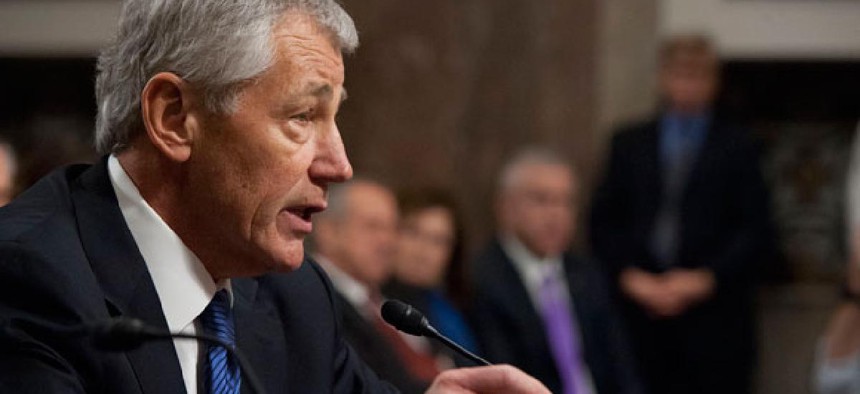
Defense Department
Will Chuck Hagel clear the Senate? White House thinks so
Victory for the Defense nominee would be narrow, administration concedes.
The White House still thinks it has the Senate votes to put Chuck Hagel in the top job at the Pentagon, but concedes it would be a narrowly won victory.
After a confirmation hearing last week that did nothing to help Hagel's candidacy, the Obama administration counts about 57 senators as supporting his nomination to lead the Defense Department. A handful more have said they would oppose a filibuster.
Hagel is continuing his Capitol Hill courtesy calls this week, scheduled to meet with roughly 20 senators, which would push his total to about 72, a senior administration official said.
And those meetings are said to have gone better than his public berating at the Senate Armed Services Committee.
"They have a very different tone than that hearing had," the official said, adding that the administration was "very confident" Hagel would clear the Senate.
Last Thursday’s hearing, during which Hagel was grilled extensively over his support for Israel, his position on Iran, and his opposition to the Iraq War, reinvigorated Republican criticism of the former GOP senator. In a Meet the Press appearance on Sunday, former White House press secretary Robert Gibbs praised Hagel, but said he came off as “unimpressive and unprepared” during the hearing.
The administration official acknowledged that Hagel’s performance had not enriched his candidacy, but countered that Republicans had missed opportunities in dwelling on Pentagons past, rather than pose questions about how the department will manage the 66,000 troops still in Afghanistan when they come home, including veterans’ issues like post-traumatic stress disorder.
“It was probably the most political defense secretary hearing we’ve ever seen,” the official said, calling it “a new kind of hearing.”
Two Republican senators, Thad Cochran of Mississippi and Mike Johanns of Nebraska, have said they will vote for Hagel.
Administration officials acknowledged they were unsure whether Republicans would filibuster. They said they did not expect Republicans to pluck any Democratic votes.
Sen. Lindsey Graham, R-S.C., told reporters on Tuesday he would like to learn more about his former colleague. “We asked him about going forward, but the best way to judge what a person will do going forward is to look at what he’s done in the past,” Graham said. “There’s some information about some speeches he’s given that I’d like to evaluate, in my view.”
Asked what he thought of Sen. John McCain, R-Ariz., a close Graham friend and ally on national security issues, announcing that he would not support a filibuster, Graham replied, “Did he say that? I didn’t see that. I’m not there yet. But filibustering is something I do very reluctantly. But again, I hope the president and his team will reevaluate this nomination. We live in very dangerous times and we want to have as much bipartisan support as possible for important positions like this. And quite frankly give the public confidence that we know where we are going.”
Pressed on his filibuster stance, Graham said, “Time will tell what we should do.”






